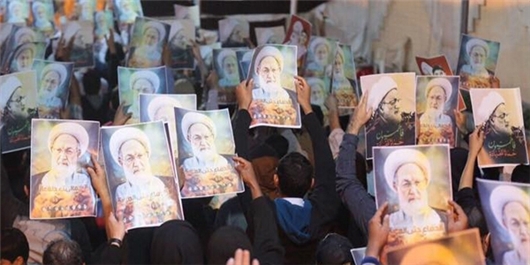
RNA - Bahrain sentenced Nabeel Rajab to five years in prison over tweets deemed critical of the Manama regime and the deadly Saudi-led war against Yemen. The prominent human rights activist was found guilty of spreading false rumours and insulting a neighbouring state - a veiled reference to Saudi Arabia. The baseless charges levelled against the activist cited laws which bar insulting a neighbouring country and insulting national institutions.
The Bahrain Center for Human Rights and the Bahrain Institute for Rights and Democracy, two leading rights groups, confirmed the sentence handed down to Rajab. The campaigner’s Twitter account posted a photo showing him smiling and flashing the victory sign after the verdict was announced.
This was all expected, as the courts in Bahrain are only used to curtailing freedom of expression by deterring citizens from criticizing its authorities. Instead of rewarding Nabeel Rajab for his brave and commendable exposure of human rights abuses and advocacy for peace, the authorities chose to punish him. On the same token, instead of standing on the side of people who have suffered beatings and torture, and showing some spine in standing up to the dictatorship in Bahrain, the American and European governments continue to sell weapons to the Manama regime and build naval bases there, which only results in one thing: The continuation of the brutal repression by the country’s unelected rulers.
As a consequence, thousands of people accused of agitating against the regime are now in prison. On a small island populated by approximately 600,000 citizens, the Shiite Muslim population continue to be discriminated against in employment and housing by the Khalifa regime. And the regime has responded to campaigns for greater democracy and equality with increasingly thuggish persecution. The latest case could be the sentencing of Nabeel Rajab.
Nor is that all. According to experts appointed by the United Nations Office of the High Commissioner for Human Rights (OHCHR), the Bahrain forces use excessive and lethal force to disperse peaceful protestors, resulting in deaths and injuries which the OHCHR condemns as unlawful killings. Many more people are also injured in the assaults, and many more have been arrested and detained.
According to the OHCHR, over the past year alone, there has been a sharp deterioration of the human rights situation in the country. This has included unacceptable restrictions on the rights to freedom of expression, freedom of association and peaceful assembly, aimed at muzzling any discordant voice and suppressing dissent. It is tragic that while security forces are meant to protect life, their actions have shown otherwise.
Worse still, they resort to drastic measures to curb dissenting opinions such as torture, arbitrary detention, unfounded convictions, the stripping of citizenship, the use of travel bans, intimidation, including death threats, and reprisals for cooperating with international organizations, including the Office of the High Commissioner for Human Rights.
The campaign groups Human Rights Watch and Amnesty International, which have persistently criticised the Bahrain regime for its repression, likewise argue that Bahrain’s association with glamour sport is used to launder a more wholesome image for the country. Like other Persian Gulf states, Bahrain is contemplating a future without plentiful income from oil, and has developed an economic plan to 2030 based on diversifying its industries and attracting tourists.
According to Fars News Agancy, it seems pretty clear that the Bahraini regime has stepped up efforts to associate the country with major sporting events as glitzy cover for an ever-worsening human rights crackdown. For the most part, Bahrain’s harnessing of the glamour and prestige of sport has helped deflect attention from the arrests of peaceful critics, reports of tortured detainees, unfair trials, and death sentences.
All these horrors and more have been perpetrated in Bahrain with help from governments in the United States and Europe, which makes them complicit in Manama’s human rights violations and crimes against humanity. For obvious reasons - one being having built naval bases there - the US and British governments, which claim human rights and justice are consistent priority far more than any gains they make from arms sales, never bother to review their problematic alliances with Manama, much less ask the repressive regime for a commitment to human rights, and discourage it from using sporting events as cover. Quite the contrary, they have prioritized arms sales and alliances with Bahrain over human rights.
In the prevailing environment, it’s never too late for the United Nations to step in and end this complicity. The world body should apply serious pressure on Bahrain to demand the immediate release of all detained human rights defenders as well as all prisoners of conscience and religious leaders; and to protect public freedom, in particular freedom of expression and freedom of assembly and association; and to stop the security forces from practicing any form of torture or ill-treatment on detainees, a practice which is well documented in recent years by the UN and regarded as systematic in Bahrain.
847/940